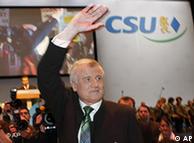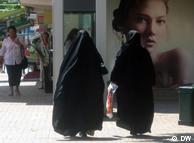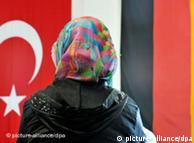INTEGRATION | 10.10.2010
State leader wants Germany to close doors to Muslim immigrants
Fresh fuel was added to Germany's ongoing integration debate over the weekend when Horst Seehofer, premier of the state of Bavaria, said Germany should not accept any more Muslim or Arab immigrants.
On the heels of Turkish Prime Minister Recep Tayyip Erdogan's meeting with Chancellor Angela Merkel in Berlin, in which the German leader reiterated that negotiations for EU membership for Turkey remained "open-ended with no guarantees," Seehofer called for excluding some groups of immigrants from Germany.
"It is clear that immigrants from other cultural circles, like Turkey or Arabic countries, have a hard time," he told the weekly news magazine Focus. "That leads me to the conclusion that we do not need any more migrants from other cultural circles."
At a regional party conference, Seehofer also declared that the Green party's concept of multiculturalism had failed. "Reality has taught us multi-culti is dead," he said.
Opposition demands apologies
 Seehofer has ruffled more than a few feathers with his remarks
Seehofer has ruffled more than a few feathers with his remarks
The Green party's parliamentary leader, Renate Kuenast, accused Seehofer of right-wing populism and demanded an apology.
The Social Democrat interior minister of the city-state of Berlin, Ehrhart Koerting, accused Seehofer of "stigmatizing" certain immigrants and undermining domestic peace.
Members of Merkel's ruling coalition, made up of the chancellor's Christian Democratic Union (CDU), the free market liberals FDP and Seehofer's Christian Social Union (CSU), expressed doubts about the Bavarian leader's comments.
"The question is whether Horst Seehofer wants to prevent additional immigration or get around existing law," the CDU's Wolfgang Bosbach told the daily Saarbruecker Zeitung. "If it's the latter, than I have doubts about its constitutionality."
German Justice Minister Sabine Leutheusser-Schnarrenberger, a member of the FDP, called for a "rational integration and migration policy - not an intentional simplification and populist debate over an end to migration."
Ongoing debate
Since August, a debate has been raging in Germany after Thilo Sarrazin, a prominent central banker, who later resigned, said the country was being made "dumber" by poorly educated and unproductive Muslim immigrants and their children.
German President Christian Wulff further fanned the flames on October 3 by saying at celebrations marking 20 years of German reunification that Islam had become "a part of Germany," earning him sharp rebukes from conservatives.
The state premier of Hesse, Volker Bouffier, rejected Wulff's assessment saying, "Islam did not belong to the foundations of our republic," and that Germany did not need to change, but rather the Islamic immigrants.
 Most Germans take umbrage at the lack of integration by Muslim immigrants
Most Germans take umbrage at the lack of integration by Muslim immigrants
Germans' integration doubts
A representative survey carried out by the Emnid polling institute last week for Focus magazine, prior to Erdfogan's visit, revealed that 60 percent of Germans oppose EU membership for Turkey.
In another poll conducted by Emnid for the Bild am Sonntag newspaper during the same period, 59 percent believed the large majority of Muslims living in Germany were unwilling to accept and respect the German constitution. In eastern Germany that figure was 70 percent.
Furthermore, 71 percent of Germans in that survey are of the opinion that the vast majority of Muslims are not prepared to accept the equality of women in everyday life. Another 68 percent doubt that most of the immigrants from Muslim countries would speak German well in the foreseeable future.
Klaus-Peter Schoeppner, Emnid director, said the survey results were cause for taking stock.
"These extreme data express a great concern among the population," he said. "They are also a clear call for action on the part of the government, and of course the migrants, to do something."
Author: Gregg Benzow (dpa/epd, AFP)
Editor: Sean Sinico


No comments:
Post a Comment